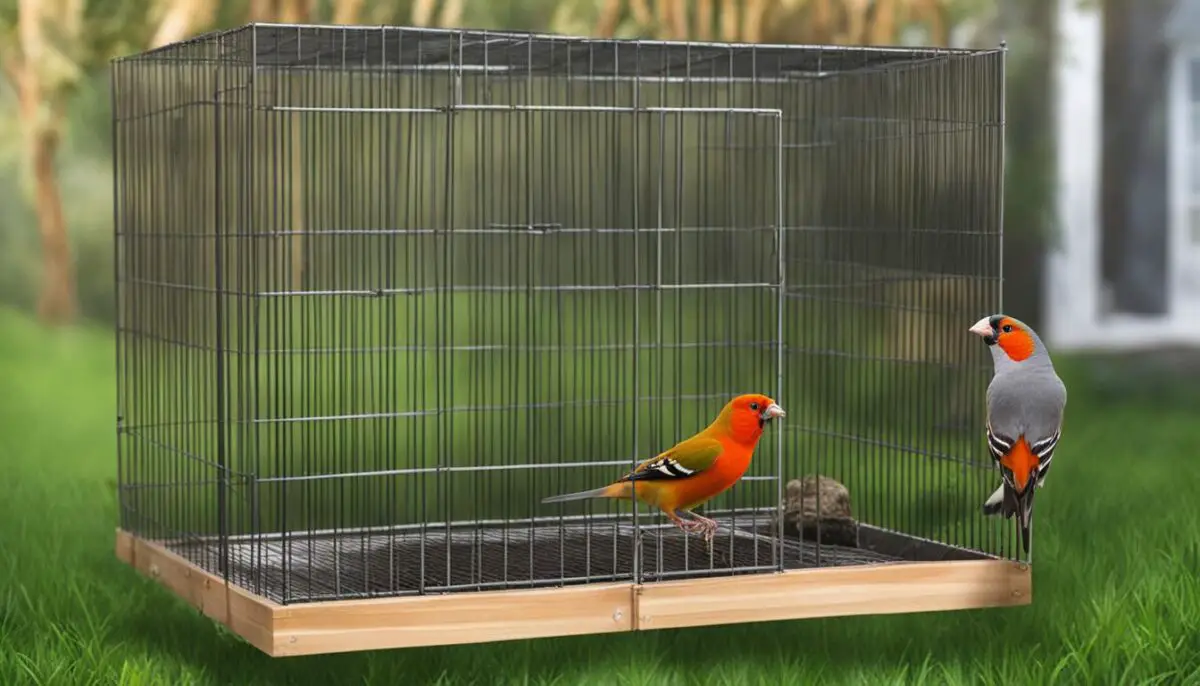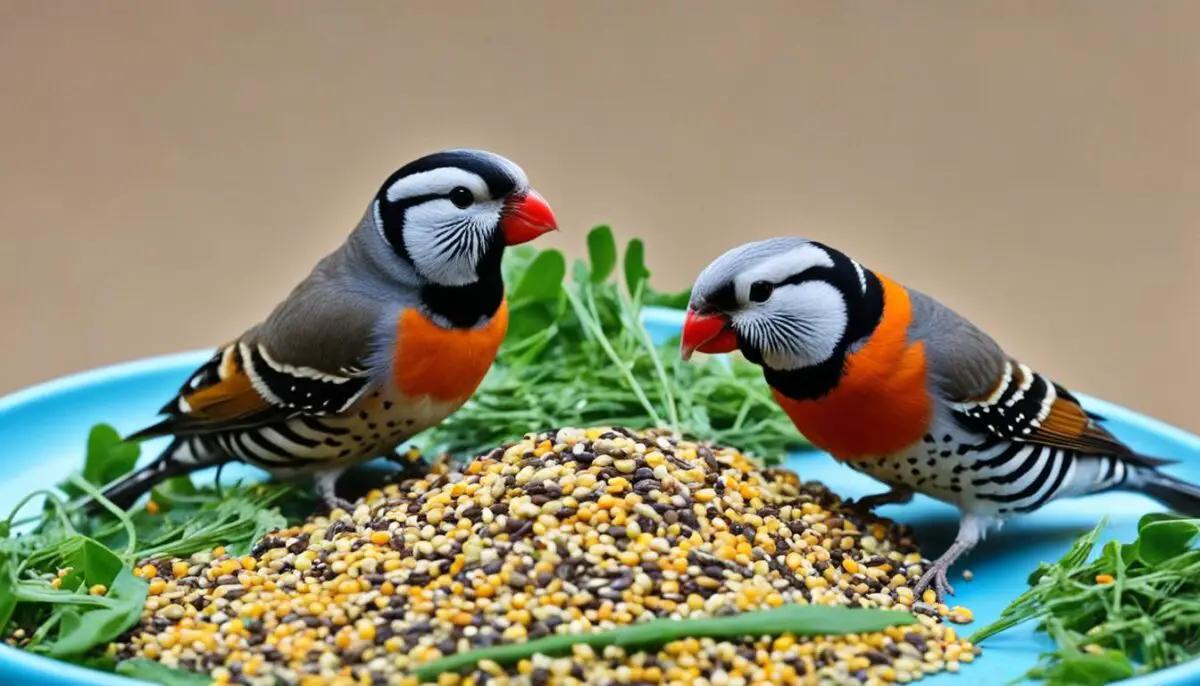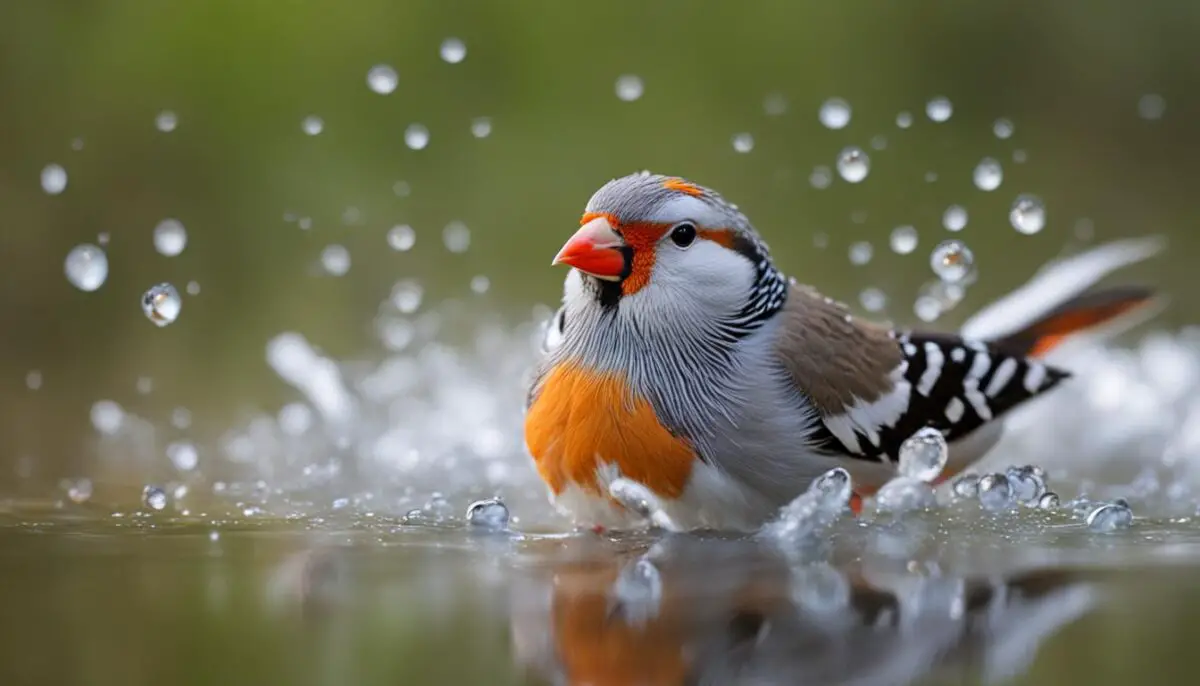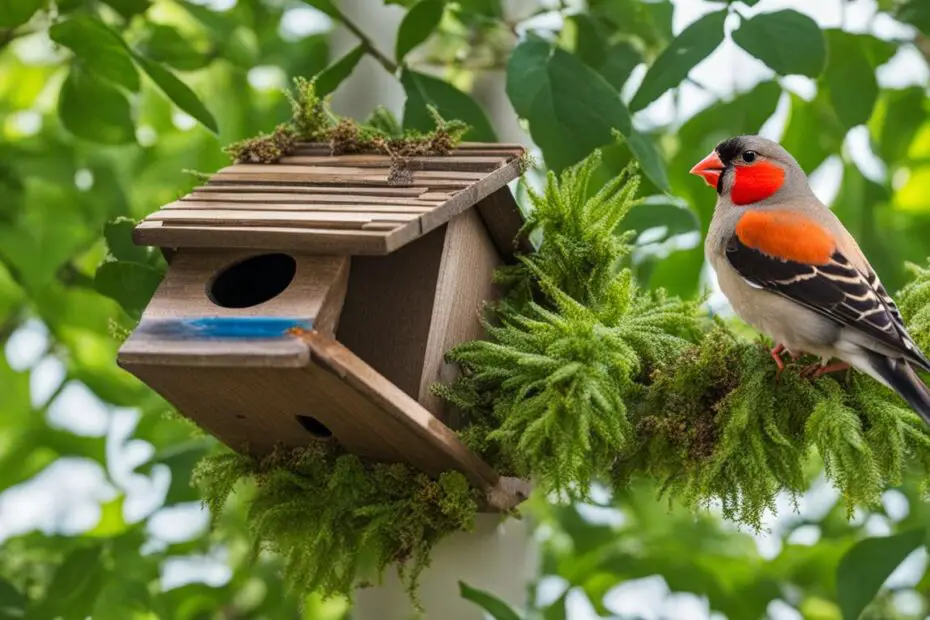If you’re considering caring for zebra finches, you’re in for a treat! These delightful birds are a popular choice for bird-keepers, especially beginners, due to their low maintenance requirements and wide availability. Zebra finches are affordable and can be found in local pet stores, bird rescues, adoption agencies, and bird breeders. With their vibrant colors and charming personalities, they can bring joy and beauty to your home.
These small birds have a lifespan of around 5 to 10 years and grow up to four inches long. They come in various color mutations, adding a touch of diversity to your aviary or cage. Whether you choose the classic “wild type” or one of the many unique variations, zebra finches are sure to capture your heart.
Key Takeaways:
- Caring for zebra finches is suitable for beginners due to their low maintenance requirements.
- Zebra finches can be found in various color mutations, adding visual appeal to your bird collection.
- With a lifespan of 5 to 10 years, zebra finches can provide years of joy and companionship.
- Whether you keep them in an aviary or a cage, providing ample space and regular cleaning are essential for their well-being.
- A well-balanced diet, including pelleted food, fresh vegetables, and other supplements, is crucial to their health.
Zebra Finch Appearance
Zebra finches are known for their unique and varied appearance. While there are many color mutations resulting from selective breeding, the classic “wild type” zebra finch remains popular among bird enthusiasts.
The wild type zebra finch is a small and charming bird with a gray plumage. They have distinct red/orange-colored legs and bills, which add a vibrant touch to their overall appearance.
Male zebra finches exhibit striking features, with bright orange cheek patches and barring across their chests. Their bills also have a deeper shade of red compared to females. On the other hand, female zebra finches are more drab in appearance, with less prominent markings.

| Aviary for Zebra Finches | Cage for Zebra Finches |
|---|---|
| Allows for more natural behaviors | Suitable for home environments |
| Requires a sheltered section for protection from the elements | Requires regular cleaning and disinfection |
| Paved floor with a sunken wire mesh | Base protected with sand sheets or loose cage bird sand |
| Provides ample space for flying and hopping | Bars spaced close enough together to prevent escape |
Feeding Zebra Finches
Zebra finches have specific dietary needs that are essential for their overall health and well-being. It’s important to provide them with a balanced and nutritious diet to ensure they thrive in captivity.
Finch Mix: The Base Diet
Seeds form the basis of a zebra finch’s diet. A high-quality finch mix that is specifically formulated for zebra finches should be the main component of their daily meals. This mix typically contains a variety of seeds, such as millet, canary grass, and various small seeds. It’s important to choose a mix that is fresh and free from dust or mold.
Water: Fresh and Clean
Providing fresh water is crucial for the health of zebra finches. They need access to clean water at all times. Ensure that their water source, such as a drinker or water dish, is changed daily to prevent contamination and the growth of harmful bacteria. Use filtered or bottled water to avoid chlorine and other contaminants that may be present in tap water.
Grit: Aids in Digestion
Zebra finches require a small pot of grit, such as crushed oyster shell or granite grit, to aid in the digestion of their seeds. The grit helps to grind down the food in their gizzard, allowing for better absorption of nutrients. Make sure the grit is freely available in a separate dish within the cage or aviary.
Supplements: Calcium and More
Zebra finches need additional sources of calcium to maintain strong bones and egg production in breeding pairs. Cuttlefish bone is an excellent source of calcium and can be provided in the cage. Additionally, zebra finches can benefit from occasional supplements of vitamins and minerals specifically formulated for finches. Consult with a veterinarian to determine the right supplements for your birds.
Fruits and Vegetables: Nutritious Treats
While seeds form the majority of their diet, zebra finches can also be supplemented with fresh fruits and vegetables. These should be offered in small quantities and be finely chopped or grated to make them easily consumable. However, certain foods should be avoided, such as avocados, onions, rhubarb, and citrus fruits, as they can be toxic to zebra finches.
Treats and Rewards: Occasionally
Millet sprays and other treats can be offered to zebra finches as occasional rewards or for training purposes. However, it’s important to offer these treats sparingly to prevent overindulgence and potential health issues.
Experimentation: Find Their Preferences
Every zebra finch may have slightly different preferences when it comes to food. It’s important to observe their reactions and preferences when introducing new types of food. Try offering a variety of fresh fruits, vegetables, and seeds to determine their favorites and ensure a varied diet.
Remember that a healthy and well-rounded diet is crucial for the overall health and vitality of your zebra finches. By providing them with a nutritious finch mix, fresh water, appropriate supplements, and occasional fruits and vegetables, you can ensure they receive the essential nutrients they need to thrive.

| Food | Quantity | Frequency |
|---|---|---|
| Finch Mix | Unlimited access | Daily |
| Water | Ad lib | Daily |
| Grit | Small pot | Ongoing |
| Calcium Supplement (Cuttlefish bone) | 1 piece | Available |
| Fruits and Vegetables | Small quantity | Occasional |
| Treats and Rewards | Sparingly | Occasional |
General Care Advice for Zebra Finches
Zebra finches are social birds and should be kept in pairs or small groups. They thrive in the company of their own kind, engaging in playful interactions and vocalizations. It is important to provide them with companionship to ensure their mental well-being.
Regular bathing is essential for zebra finches to maintain healthy feathers and good hygiene. You can offer them a saucer of water or mist them gently with tepid water to simulate natural rain. However, it’s crucial to remove any open water sources before nighttime to prevent chilling.

Zebra finches have unique behaviors that distinguish them from other pet birds. Unlike budgies or lovebirds, they are not typically trainable and do not tame down to the same extent. These birds are best enjoyed from a distance, observing their charming antics and beautiful plumage.
Health Care for Zebra Finches
Zebra finches, like any other pets, require proper health care to ensure their well-being. While they are generally hardy birds, there are some common health issues that can arise. Understanding these issues and taking appropriate measures can help prevent and address potential problems.
Common Health Issues in Zebra Finches
1. Scaly Face: Scaly face is a condition caused by skin mites that infest the face and beak of the finches. It can cause scaly, crusty lesions on the skin, affecting the bird’s appearance and overall health. Immediate veterinary care is crucial to treat this condition. Regular inspections and prompt treatment can help prevent the spread of mites among your finches.
2. Air-Sac Mite Infections: Air-sac mite infections can occur in zebra finches and may lead to respiratory problems. These tiny parasites infest the air sacs in the bird’s respiratory system, causing breathing difficulties and various health issues. If you notice your finches having trouble breathing or exhibiting respiratory symptoms, it is important to seek immediate veterinary care.
Regular vet visits are important to maintain the health of your zebra finches. During these visits, the vet can perform health checks, assess the birds’ overall well-being, and address any potential issues before they become serious. Your vet can also provide guidance on preventive measures and offer advice on specific health concerns relevant to zebra finches.
Nail and Beak Trimming
Another aspect of zebra finch health care is nail and beak trimming. Over time, the nails and beaks of finches can become overgrown, causing discomfort and potential injury. It is recommended to have a vet or an experienced bird groomer trim your finches’ nails and beaks to an appropriate length. Regular trimming ensures that your finches can perch and eat comfortably without any issues.
If you notice any abnormal symptoms or behavior in your zebra finches, such as breathing problems, lethargy, loss of appetite, or changes in appearance or vocalization, it is important to seek veterinary care as soon as possible. Early detection and prompt treatment can contribute to better health outcomes for your feathered friends.
Conclusion
Caring for zebra finches is a rewarding experience that requires attention to their housing, diet, and general care. These social birds thrive in pairs or small groups, so it’s essential to provide them with companionship. While zebra finches may not be highly trainable, their inquisitive nature and vocalizations make them delightful to observe.
To ensure the well-being of your zebra finches, it’s crucial to create a suitable housing environment. Whether you choose an aviary or a cage, make sure it offers enough space for them to fly and hop around. Additionally, maintain a clean and hygienic living area by regularly cleaning and disinfecting the cage or aviary.
A balanced diet is vital for the health of zebra finches. Offering a quality finch mix as their base diet and supplementing it with fresh fruits, vegetables, and calcium sources like cuttlebone will help keep them nourished. Remember to provide them with clean drinking water and a dish of grit to aid their digestion.
Lastly, keep a close eye on your zebra finches’ health and seek veterinary care if any unusual symptoms arise. Regular check-ups and prompt attention to health issues will contribute to their overall well-being.
By following these care guidelines and providing the necessary attention, you can ensure that your zebra finches live a happy and healthy life in your care.
FAQ
What makes zebra finches popular among bird keepers?
Zebra finches are popular among bird keepers because they have low maintenance requirements and are widely available. They are also affordable and come in various color mutations.
How long do zebra finches live?
Zebra finches have a lifespan of around 5 to 10 years when kept in captivity.
What is the recommended housing for zebra finches?
Zebra finches can be housed in an aviary or a large flight cage with wires spaced ¼ to ½ inch apart.
What should I feed my zebra finches?
Zebra finches should be fed a well-balanced diet consisting of pelleted food designed for finches, fresh vegetables, seed mix, and grubs. Avoid feeding them avocados, onion, and citrus fruits.
Are zebra finches social birds?
Yes, zebra finches are social birds and should be kept in pairs or small groups.
How do I care for the health of my zebra finches?
Regular vet visits are important to prevent and address common health issues in zebra finches. If you notice any abnormal symptoms, take your finches to the vet immediately.
Can I train my zebra finches?
Zebra finches are not highly trainable and do not typically tame down like other bird species. They are best enjoyed from a distance.

